Par Wu Tingyao

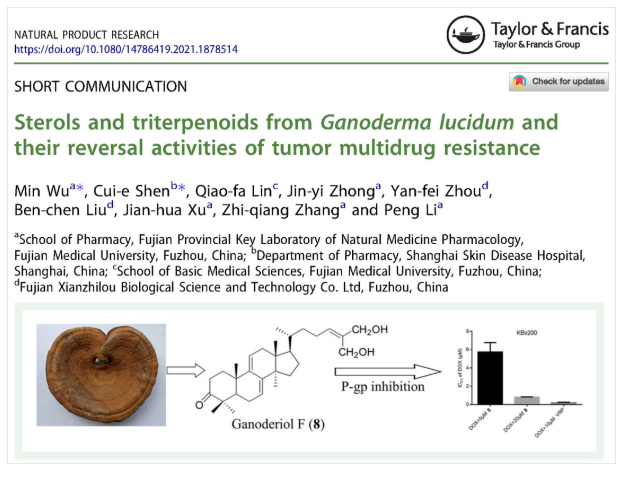
Cancer is difficult to treat because cancer cells develop drug resistance, meaning that drugs that would be originally effective in killing cancer have to be used at higher doses to be effective.
The problem is that chemotherapeutics will also kill normal cells, so it is impossible to pursue high doses without an upper limit in order to effectively kill cancer.
In this situation, patients usually have to replace drugs. For lucky patients, the cancer was controlled after they change drugs. Cependant, most patients do not have alternative cancer drugs. After the cancer cells are resistant to the original drugs, the patients can only resign themselves to their fate.
It is not easy to develop new drugs. Donc, how to reduce the resistance of cancer cells to existing drugs has become another way to survive.
In March of this year (2021), the research team of Professor Li Peng from the School of Pharmacy, Fujian Provincial Key Laboratory of Natural Medicine Pharmacology, Fujian Medical University published a report in “Natural Product Research” stating that a variety of triterpenoids in Ganoderma lucidum have the activity of “reducing the drug resistance of cancer cells”.
Combining Ganoderma lucidum triterpenoids with chemotherapy to weaken the drug resistance of cancer cells
The researchers used the fruiting bodies of Ganoderma lucidum planted by Fujian Xianzhilou Biological Science and Technology Co., Ltd. as materials, first extracted them with ethanol, and then further analyzed the components in the extract. They found that there were at least 2 kinds of sterols and 7 kinds of triterpenoids (Chiffre 1) in the extract.
Among these components, 6 kinds of Ganoderma lucidum triterpénoïdes (components 3, 4, 6, 7, 8, 9) can significantly improve the killing effect of traditional chemotherapy drug doxorubicin (DOX) on multidrug resistant oral cell carcinoma, c'est, lower doses of chemotherapeutics can be used to achieve the effect of killing half (50%) of multidrug resistant cancer cells (Chiffre 2).
Parmi eux, the combination of ganoderiol F (component 8) and doxorubicin has the best effect. A cette époque, only one-seventh of the dose of doxorubicin when used alone has the same effect (Chiffre 2).
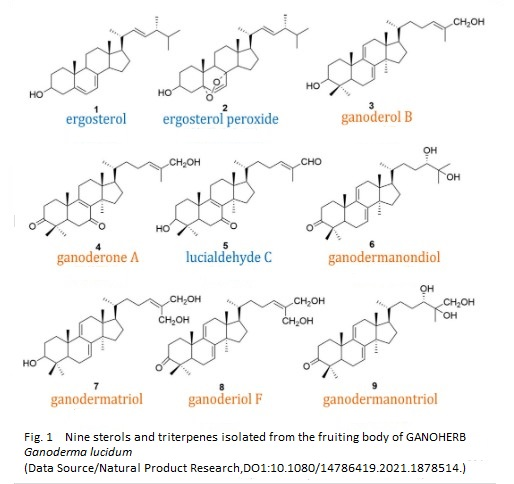
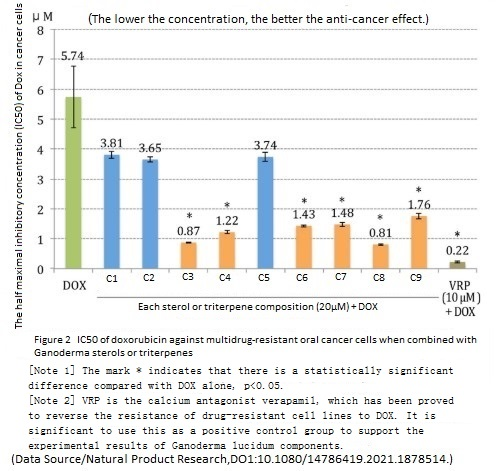
Normal doses of chemotherapeutics are difficult to kill cancer cells that have developed drug resistance.
How difficult is it to treat cancer cells when they develop multidrug resistance? You can learn superficially from Figure 3.
Adding 0.1μM doxorubicin to human oral cancer cells, after 72 heures, the survival rate of general cancer cells is almost reduced to about half, but multidrug resistant cancer cells are almost unaffected (Chiffre 3 orange dotted line).
From another perspective, in order to reduce human oral cancer cells to 50%, the dose of doxorubicin required to deal with multidrug-resistant cancer cells is almost 100 times the dose of doxorubicin used to deal with general cancer cells (Chiffre 3 Green dotted line).
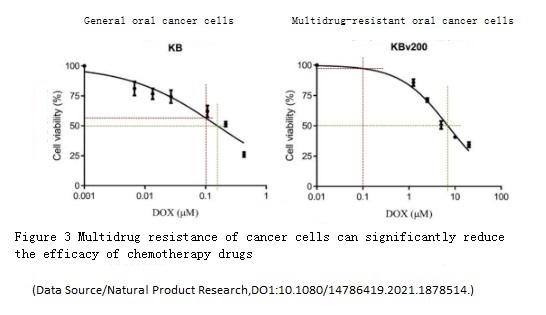
This result is derived from cell experiments conducted in vitro. It is impossible to do this when treating patients because it is impossible for us to sacrifice the normal cells that the body depends on to eliminate cancer cells.
Donc, what we can do is only let cancer cells grow at will? of course not. Because the research results presented in Figure 2 have told us that if chemotherapeutics and certain Ganoderma lucidum triterpenoids can be used together, there is a chance to reverse the multidrug resistance developed by cancer cells to make the chemotherapy effective again.
Pourquoi peut-on Ganoderma lucidum triterpenes weaken the resistance of cancer cells? According to the analysis of Professor Li Peng’s team, it is related to P-glycoprotein (P-gp) in cancer cells.
Cancer cells become drug-resistant by expelling chemotherapy drugs while Ganoderma lucidumtriterpenoids can retain the chemotherapydrugs inside the cancer cells.
The P-glycoprotein, which is located in the cell membrane and straddles the inside and outside of the cell, is like a cell’s protection device, which “transports” substances that are harmful to cell survival to the outside of the cell, thereby protecting the cell from harm. Donc, many cancer cells will produce more P-glycoprotein with the progress of chemotherapy, making it difficult for the drugs to stay in the cells.
Donc, the drug resistance in our impression is actually the way for cancer cells to protect themselves. This is why the replacement of drugs to the end not only fails to disarm the cancer cells but also promotes their multidrug resistance.
Cancer cells, of course, need to guard against chemotherapy drugs for their own survival. Heureusement, Ganoderma lucidum triterpenoids have a way to break down the defenses of cancer cells. The researchers’ analysis with Ganoderiol F, which has the best effect in reversing drug resistance, showed that culturing multidrug-resistant human oral cancer cells with Ganoderiol F (20 µM) pour 3 hours and then adding the chemotherapy drug doxorubicin can significantly increase the amount of doxorubicin accumulated in cancer cells.
Fait intéressant, the number of P-glycoproteins in cancer cells was not reduced by the intervention of Ganoderiol F, so the researchers speculated that Ganoderiol F should weaken the “transport function” of these P-glycoproteins, allowing doxorubicin to remain in cancer cells and cause damage to cancer cells.
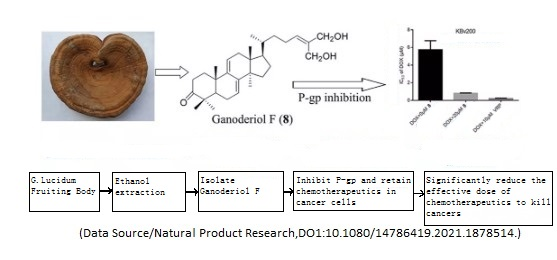
Without the alcohol extract of Ganoderma lucidum to help out, there is undoubtedly a lack of many anti-cancer weapons.
Since the researchers only explored the mechanism of reversal of drug resistance by Ganoderiol and did not analyze other triterpenoids, they do not know how other triterpenoids make a highly drug-resistant human cancer cells become non-resistant to drugs?
Since this experiment discussed the triterpenoids and sterols separately, people can’t help but wonder if the joint use of them and chemotherapy drugs can make the effect better.
But at least this research tells us that the effective components of Ganoderma lucidum which weaken the drug resistance of cancer cells are contained in the ethanol extracts of Ganoderma lucidum fructifications. The safety and effectiveness of the ethanol extract of Ganoderma lucidum fruiting bodies have been universally acclaimed since it was used for various diseases in the 1970s.
Donc, without the ethanol extract of Ganoderma lucidum, there will definitely be fewer anti-cancer weapons. If you don’t want cancer treatment to fall into the vicious circle of multidrug resistance, you may start by choosing the right Ganoderma lucidum!
[Source de données] Min Wu, et autres. Sterols and triterpenoids from Ganoderma lucidum and their reversal activities of tumor multidrug resistance. Nat Prod Res. 2021 Mar 10; 1-4. est-ce que je: 10.1080/14786419.2021.1878514.
FIN
À propos de l'auteur/Mme. Wu Tingyao
Wu Tingyao a fait un reportage de première main Ganoderma lucidum information
depuis 1999. Elle est l'auteur de Guérir avec Ganoderma (publié dans The People's Medical Publishing House en avril 2017).
★ Cet article est publié sous l'autorisation exclusive de l'auteur, and the ownership belongs to GANOHERB ★ The above works cannot be reproduced, excerpted or used in other ways without the authorization of GanoHerb ★ If the works have been authorized to be used, ils doivent être utilisés dans le cadre de l'autorisation et indiquer la source: GanoHerb ★ Violation of the above statement, GanoHerb will pursue its related legal responsibilities ★ The original text of this article was written in Chinese by Wu Tingyao and translated into English by Alfred Liu. S'il y a une divergence entre la traduction (Anglais) et l'original (Chinois), le chinois original prévaudra. Si les lecteurs ont des questions, veuillez contacter l'auteur original, MS. Wu Tingyao.

Transmettez la culture de santé millénaire
Contribuer au bien-être pour tous



